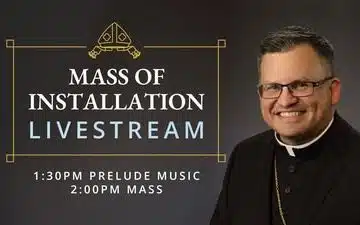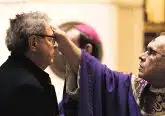Benedict XVI and the New Evangelization
In Evelyn Waugh’s novel, A Handful of Dust, the young son of the main character (Tony Last) is tragically killed in a horse- riding accident. Immediately after the accident, the parish vicar comes to Tony’s house to console him, but after the pastor leaves, Tony explains to a friend that he only wanted to discuss funeral arrangements. When the vicar “tried to be comforting,” Tony complains, “it was very painful. After all, the last thing one wants to talk about at a time like this is religion.” The scene calls to mind the late Pope Benedict XVI’s admonition for us Catholics to reinvigorate our faith through what Pope St. John Paul II called the “new evangelization.”
When Pope Benedict XVI died on December 31, 2022, he left a rich historical legacy of service to the Church. His reputation as a world-renowned theologian was already well- established before both his 1977 elevation to Archbishop of Munich in his native Germany and his eventual election as the 264th successor to St. Peter in 2005. As a young theologian, Father Joseph Ratzinger was highly influential at the Second Vatican Council as peritus (an official theological advisor) to Josef Cardinal Frings of Cologne, one of the most prominent Council fathers. In that capacity, his greatest contribution was to the “Dogmatic Constitution on Divine Revelation” (Dei Verbum), which he, as a 35-year- old university professor, completely rewrote after reading the poorly crafted first draft. For 24 years before being elevated to Pope (from 1981 to 2005), Cardinal Ratzinger was Prefect of the Congregation for the Doctrine of the Faith, the chief Vatican office overseeing the development of Church doctrine.
Also a prolific author with over 50 books, Father Ratzinger’s Introduction to Christianity (1968) is one of the most widely read theological books in history. During his eight years as Pope, Benedict wrote three encyclicals: Deus Caritas Est (2005), Spe Salvi (2007), and Caritas in Veritate (2009). And his magnificent three-volume book series, Jesus of Nazareth, may be his most beloved and admired literary legacy. But one of the lesser-known documents of his papacy—and the Vatican institution created by that document—may have a larger impact on the worldwide Church than his encyclicals and other better-known writings. On September 21, 2010, the Feast of St. Matthew the Evangelist, Pope Benedict issued the Apostolic Letter, Ubicumque et Semper (US), to establish the Pontifical Council for Promoting the New Evangelization.
“It is the duty of the Church to proclaim always and everywhere the Gospel of Jesus Christ,” the letter begins. Over the course of the Church’s history, the form of spreading the good news has had to adapt to regional customs, technological advances and political and social developments. “In our own time,” Pope Benedict explains, proclaiming the gospel “has been particularly challenged by an abandonment of faith.” Echoing his other writings and speeches that described the rise of secularization, Benedict describes “a troubling loss of the sense of the sacred,” which has called into question the meaning and purpose [of ] some of the most fundamental and common human experiences, such as “birth, death, [and] life in a family.”
Benedict explains that it is in this context that Pope John Paul II makes the “urgent task” of the “new evangelization” a “central point” of his papacy. While John Paul’s call is consistent with Jesus’ charge in the Gospel of Matthew to “go and make disciples of all nations,” the new evangelization focuses especially on the task of re-evangelizing professed Catholics. John Paul emphasizes evangelizing “particularly in regions Christianized long ago,” says Benedict, where professed Christians now live “as if God did not exist.” He explains that Christians’ “indifference to religion and the practice of religion devoid of true meaning” are as troubling as declared atheism. Professed Christians maintain “some of the externals of … tradition and rituals,” Benedict worries, but separate their faith “from those moments of human existence which have the most significance.” Thus, an urgent agenda for the new evangelization is “a mending of the Christian fabric of society.” Professed Christians can hardly be effective evangelists if they live as though the Gospel makes no difference in their own lives.
Toward that end, Benedict’s Ubicumque et Semper established the new Pontifical Council and charged it with “identifying and promoting suitable ways and means to accomplish” the new evangelization (US, 1). This included specific instructions, among other things, “to examine … the theological and pastoral meaning of the new evangelization”; to “encourage the use of modern forms of communication”; and “to promote the use of the Catechism of the Catholic Church as an essential and complete formulation of the content of the faith for the people of our time” (US, 3).
Most importantly, though, Pope Benedict tells us directly that to be a Catholic Christian is not to subscribe to a philosophy, but rather to have a personal encounter with the living Christ. Quoting from his encyclical, Deus Caritas Est, the Pope explains, “Being Christian is not the result of an ethical choice or a lofty idea, but the encounter with an event, a person, which gives life a new horizon and a decisive direction” (Deus Caritas Est, 1). As Vatican Council peritus, professor, author and Pope, the late Father Joseph Ratzinger left the Church with a detailed map by which to navigate toward that horizon.
Dr. Kenneth Craycraft is an attorney and the James J. Gardner Family Chair of Moral Theology at Mount St. Mary’s Seminary & School of Theology.
This article appeared in the March 2023 edition of The Catholic Telegraph Magazine. For your complimentary subscription, click here.













